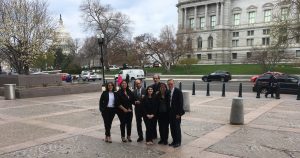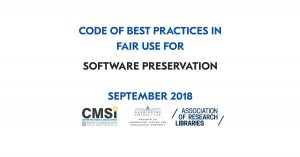Every three years, users ask the Copyright Office, in the Library of Congress, for exemptions from the Digital Millennium Copyright Act’s strictures on breaking encryption. Without such exemptions, you cannot use your fair use rights on encrypted material. This year, good news came for, among others, filmmakers and for museums and archives.

CMSI Founder Patricia Aufderheide with the team from the University of California Irvine Intellectual Property Clinic after she testified at the Library of Congress on the topic of Digital Millennium Copyright Act exemptions.
Filmmakers.
Documentary filmmakers have long had an exemption, but they have been arguing for years that fiction filmmakers should be included. This time, the Librarian of Congress agreed. She ruled that “the existing exemption for documentary films be expanded to include a subset of fictional (e.g., narrative) films for purposes of criticism and comment, where the clip is used for parody or its biographical or historically significant nature.”
Filmmakers got help from the University of California Irvine’s law clinic, led by Prof. Jack Lerner, who is also on the board of the International Documentary Association, and leading film lawyer Michael Donaldson. I was privileged to testify. At Kartemquin Films, which spearheaded the initial effort for documentary filmmakers and whose engineer Jim Morrisette also testified, Tim Horsburgh said, “This will level the playing field for indies!”
Software preservation.
New to the process were software preservationists. They preserve obsolete software, so that we can access our digital past. They were being stopped from doing the basic work of preservation because the DMCA makes breaking encryption a crime. They were able to explain their case to the Copyright Office, with the help of Harvard’s legal clinic. Under the new rules, people in libraries, archives and museums can now break encryption for activities like migrating software to a new format, running it to access otherwise inaccessible files, and making it available on premises for research, among other things.
As  my colleagues and I documented in a report earlier this year, software preservationists have always had extra challenges because of the technical protection mechanisms built into software, which were illegal to crack. My co-author Brandon Butler recalled hearing again and again, in our interviews, “Maybe what I’m doing is ultimately legitimate, but I had to crack the encryption to make it run, and that’s a whole separate legal hassle, right?” Not anymore. Software preservationists are further helped by their new Code of Best Practices in Fair Use for Software Preservation, which CMSI helped to create.
my colleagues and I documented in a report earlier this year, software preservationists have always had extra challenges because of the technical protection mechanisms built into software, which were illegal to crack. My co-author Brandon Butler recalled hearing again and again, in our interviews, “Maybe what I’m doing is ultimately legitimate, but I had to crack the encryption to make it run, and that’s a whole separate legal hassle, right?” Not anymore. Software preservationists are further helped by their new Code of Best Practices in Fair Use for Software Preservation, which CMSI helped to create.
Other good news.
Authors won big as well. Now you can break encryption to add fairly-used content to e-books on any topic, not just about film. As well, the Copyright Office has also streamlined its renewal process, making it easier for groups that simply want to renew their exemption as is to do so. All existing exemptions were renewed, including for jailbreaking mobile devices, using video clips for educational and noncommercial purposes, and for playing video games where server support is gone. The whole report is here.
Know your rights.
None of these changes would have happened if people had not recognized the value of their fair use rights, been aware of the DMCA exemption process, taken the time to make their case, and worked with the dedicated law professors and students who shepherded the process.
